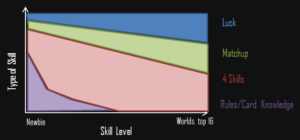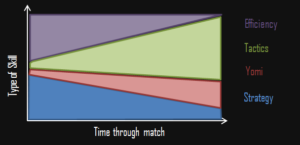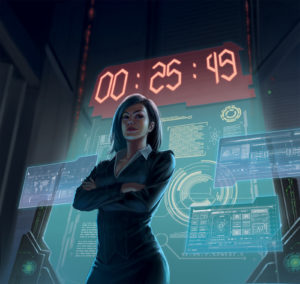Welcome to the fifth article in the series The Skills of Netrunner. Today we will talk about the various aspects of performing well in a tournament. Tournaments are a great way to play Netrunner. This is where you will get to encounter all types of strange new decks, and meet a bunch of really nice people. This is also where all your hard work will pay off and you will get to dip your toes in what I consider the most fun way to play the game!
What separates tournament-play from normal play, you ask? Well, apart from the excitement, prizes and people, is that you will be playing a different game this time around. In fact, you will be playing two new games! Huh? Really? First, you will be unaware of what is in your opponent’s deck, what they are trying to do. This introduces an element of scouting and meta-knowledge into your matches. You will also play a completely different game at the same time for the first time: the meta-game!
Now you will also get to set yourself into the final state of mind: proving mode. Time to wield that sword. In this state of mind you will only focus on the now, the current board state, your moves, the opponent’s possible moves and your decisions. Nothing else matters.
This means that you are not here to learn, thus no point in mulling over mistakes or fears. Concentrate, as always, only what you can change. Different from practice, this time around you are not trying to change your mind over time, you are trying to change the game-state to win.

Tournaments were invented in france, by the pope, to stop the nobility from killing eachother off.
We have come a long way..
For New players and Old
I will have a slightly different format for this article. I believe that different things are important for different levels of player experience, and I will dedicate some parts more to those who have been in the scene for a while and some parts to those of you who might just be starting, or are curious of going to your first tournament!
Now, take a look at the graph below. It will become relevant as soon as we enter the discussion about what affects your results. I believe (and this is just like my opinion, man) that what affects a game of Netrunner varies as players vary in skill. In a match of evenly matched opponents i believe some things are vastly more important for newer players and more experienced players respecively.

Where do you place yourself on this graph?
If i am correct, this means that you should consider where you believe you are on the graph above when deciding where to put in effort before a tournament. If you are at the beginning; know the rules well. If you are entering the middle, well this is where practice (as we discussed in the last article) will start making a real difference. If you are nearing the second half of the graph you might want to consider things like decks and meta a bit more.
The reason for this effect is simple: better players make fewer mistakes. For each mistake not made, other factors are more important in deciding the match outcome. Then of course if two hypothetical players make no mistakes then only luck and matchup would decide the match outcome. Luckily i observe Netrunner to be deeper than that. Also, if you are completely new you will experience frustration with lack of rule- and card knowledge. This is easy to understand, and we all recognize that, but stick with it. There is a massively interesting game waiting for you on the other side of that barrier!
I will try to list the factors that will affect your success in the tournament, give some general advice as well as hint at if the specific factor is especially important for a new player or an experienced player. First, however, we need to look at a final concept.
The Meta-Game
What is called the meta-game is the interplay between the decks that are popular at the moment, and the decks and cards that are especially good or bad against those other decks. Every tournament has its own meta and this is only revealed to all players once the tournament is over, seeing as you will not know the contents of your opponents decks.
What is called ‘the meta’ in internet forums is really meant to mean an average of the different tournament-metas at the moment. In fact, different areas naturally develop different metas, which is an exciting aspect of traveling to other player groups to play in a tournament. This also introduces a way a player can really ‘shoot the moon’ by selecting decks that potentially sweep the floor with the popular decks. This leads some especially competitive players to develop their decks in secret before a major tournament. We saw this before worlds this year for sure. However, they all came to the same conclusion.. 😉
Before a tournament you will have to select a deck that you think will allow you to succeed in the tournament, but once you enter the tournament this is no longer in your control. In a sense, you have already finished playing the meta-game at that point. This means that if you choose to take part in the meta-game of a tournament, this is something you do beforehand.
As we discussed you should only use your energy caring about things in your control, and thus the only time you should care about meta is before a tournament. This means that we will look at pre-tournament factors and in-tournament factors separately.

Some players travel a long way to a tournament, we all do it for the fun.
Pre-tournament Factor 1: Knowing the Meta
It is generally known what are ’good decks’ at the moment, whether this is true or false you will usually see a lot of these decks. While you cannot predict if some genius is coming up with a master-plan to beat your own decks in secret (the bastard!) you can be sure to face a lot of what is popular at the moment. This introduces practice for the purposes of a tournament, which differs a bit from normal practice. The types of decks you play and play against are more interesting in this type of practice.
You should get a friend who is interested, and together you should build the decks that you think you will face a lot of at the tournament. You should especially concentrate on the decks that you believe will be the most difficult for your own decks. You will both learn a lot from both playing against those decks, and playing with them.
It is not as obvious from the opposing side, but once you play your nemesis-deck yourself you quickly realize how it is likely more difficult to play than you realized, and you will find the weaknesses of it when you see what you are worried about during the games.
In this process you can usually learn a lot of specific tactics or tricks that were not immediately obvious before. This is very helpful when in the tournament, and you are hard pressed to make good decisions on a time-budget!
The last thing this process will teach you is if you do need to include counter-cards specifically in your decks, to prevent a certain matchup from being especially unfavourable. You should never include cards in your deck that helps make good matchups even better, the only cards you should add that are not part of your core strategy are things that help you shore up your weaknesses!
If you are starting
You will usually need general practice more than you need specific practice. It does help of course to have played against the common decks, but before that is helpful you should concentrate on playing against many varied common archetypes. People show up with a lot of different decks and you will face a lot of crazy new things. This is especially true at the lower tables (or, as some argue, the fun tables). Make sure that you are generally comfortable with what the differences are between kill-decks, fast-advance and glacier and how to effectively play against those.
Pre-tournament Factor 2: Playing the Meta
Choosing your deck specifically to counter meta-effects can be very effective. This ranges from tuning your deck to improve your odds against the common nemesis-decks to actually changing and playing a deck specifically to counter the dominant decks. This is always a trade-off between playing what you are comfortable with and skilled at, and choosing something that you believe is powerful at the moment. You will inevitably sacrifice your position on the efficiency curve to bet on playing something with higher power level.
This becomes more and more attractive as you increase in skill I would say, since matchup is usually more important at higher skill-levels and you are probably also comfortable with playing a broader range of decks well.
A mild variant of this is to slot a couple of counter-cards to target the meta in your own decks. This takes up valuable card slots (usually so-called tech-slots) that you can use to shore up your decks weaknesses, so doing this is a gamble. There is also a case to be made for accepting some really bad matchups if trying to improve them would decrease the power of your deck against all other matchups too much. You do not have to win every match after all, you just have to win more than your opponents do.
Also, before even considering adding counter-cards first consider how you can play around the problem. Yes, that was a threat. I will hunt you down and steal your sleeves. Problems can often be played around by adjusting your play (increasing your skill, if you please) to counter them. Only if that does not work you should add counter-cards.
An excellent example of this is the first time a player encounters the SEA-source+Scorch combo. It seems ridiculously overpowered. The answer? Money. Simple. We saw this all over again with Hard Hitting News, Damon must be very pleased..
If you are starting
Or if you are not especially interested in this sort of game, don’t worry. There are always decks that are good enough to have a chance and, unless you are playing at a very high level, your player-skill and comfortability with your own decks is a much more important factor when going to a tournament. Look at the graph above!
If you are new to the game, or are going to lower level tournaments like Game Night Kits, or local events you should not worry too much about the meta. People are usually very relaxed at those events and you should play what you are comfortable with. Hopefully you have followed my advice in the previous article and have gotten in a few games with good mid-range decks that you like and feel comfortable with.
Trust me, I’ve been playing Jinteki PE and Leela for almost two years, and have kicked ass doing it all the way through those metas. This includes beating many shocked net-deckers. The meta is vastly overstated in importance for the majority of players.
Pre-tournament Factor 3: Take care of your Mind
From article two we know that how you feel affect how well you perform. A tournament is fun but if you are competitive it will require a lot of your concentration and energy. First you should take care to sleep well, to eat a good breakfast and to bring some drink or snacks if you feel like you need to. A tournament lasts for many hours, and while there are breaks for lunch you will need all the energy you can get.
It is easy to get nervous, but this also applies to your opponents. People are nice in this community, and even though we all want to win, we also do it because it is fun. Why else travel halfway across your country to maybe win a glorified mousepad? Relax, greet your opponents, and have fun!
If you are starting
Welcome to the crowd. It sure would be nice being you again! In your position you have nothing to prove, and everything to gain. Look forward to facing interesting decks, learning from skilled opponents and experience applying everything you’ve learnt to see how well you match up against players who all will want to win. Go in with the expectation of doing your best and having fun and you will have a great time.

The fanciest mouse-pad. No, no. You know i’m right.
Game Factor 1: Starting Hand
Before you even start playing you have a decision to make. How do you know if your hand will allow you to win? This becomes much more important when you increase in skill and meta knowledge. By looking at your opponents ID you can usually take a guess at what they could be up to. Without knowing for sure, you need to decide to keep or mulligan however, and you have to consider your own boardstate as well.
What decides if your starting hand is good or not is usually your strategy for the match. You always want to get going with doing things as efficiently as possible, but different opponents let you get away with different things. Your starting hand will not set you up for late game, mostly it will ensure you stay in the early game and do not leave any easy exploits open for your opponent.
There is a great themed article-series on this very site delving deeper into this topic by Miek, so i will not delve into specifics here since this can be an extensive subject. In short, look at your hand, consider what you think the opponent wants to do and how this helps you get in and disrupt that as soon as possible (if you play tactical) or how you can get a great kickstart to your own plan (if you play strategic).
If you are starting
This is less important for you as the decision is usually very impacted by if you are able to guess what the opponent is up to. Make sure you get a good start with your own deck instead so that you can compensate with power in the mid-game when you have gotten some more information. Also, note your opponents ID ability. That will give you clues of what to expect.
In general, keep things in your mind like ‘raising money quickly’ if you think you will be facing trace-operations like SEA Source or Hard Hitting News, and others of this type of single mistake that can easily cost a match. Versus Eater/Keyhole anarchs you’ll want to defend HQ quickly for example.

Game Factor 2: Scouting
Oh boy, isn’t this different? In practice you had full knowledge of the opponent’s deck. Now you are left in the dark for the early parts of the game. Depending on your level of meta-knowledge and the particular hive-mindedness of the meta at the moment it can be easier or harder to guess what you will be facing. Now, different from some of your practice-games, if you do not know what you are facing it is way more important to go in there and get some information that helps you discern that.
The value of runs for information value is larger in a tournament, especially if you are facign something strange that you do not recognize. By identifying what the opponent is up to it allows you to adjust your strategy early. A sure way of doing this is (from the runner side) to make runs at R&D or HQ when they are affordable, or make sure to get some additional value out of running archives (dirty laundry?).
The most important information to look for is cards that are typically only seen as part of a combo (like tagging things) or cards that cost influence. Also you should know well what cards and combos you own deck is weak against and try to figure out if you are facing that type of opponent.
When a sizeable chunk of cards are visible in your opponent’s Archives or Heap respectively make sure you look through it (ask them first, it is polite). After a while you will be able to count the influence they spent on some things. Influence is very valuable, and few people spend it on things that do not benefit their core strategy or things that are generally powerful. The most important thing here is that this allows you to start excluding some cards as options based on influence that you can see and guesswork based on their strategy. It can be very important to know if your NBN opponent imported Biotic Labor or not as the game goes on for example, and this method allows you a shot at this.
If you are starting
You should not yet worry about things like counting influence, but information in general is more valuable to you than to any other player! This is one of the areas where you will do well to concentrate a bit extra as the less experience you have the less seeing a single card means to you. However by looking at what you know in general about the various factions and archetypes you can start to piece together a lot by looking at the cards that your opponent plays and discards.

Game Factor 3: Using your Skills
The game! We’ve been beating around the bush for a good while, but finally, we have arrived. Your tournament game will be decided by you. Who you are facing is not in your control, what deck they brought is not either. You will eat up the odds the game gives you and chew those down with your pile of knowledge and experience. You’ll spit that out in your utilization of the four skills of Netrunner. Mm. Tasty.
You are in the proving mode, and what you want to do is to play as well as you can. If you feel like you played as well as you could given your opponent’s skill and experience, the matchup and the variance of the game, you will have a good time and results to be proud of regardless of your skill-level. Let’s look at where you should be concentrating your efforts during the game:

Where are skills the most important?
What you see above is a very general diagram of where in a given match what skills are the most important. This may vary a lot in a specific game, matchup or situation so i provide this purely theoreticised graph for you to get a hint of what i’m talking about. If you play or play against a Yomi deck or a strategic deck this will obviously look a lot different. The best decider of where to put your efforts in your specific game will be you.
For efficiency is is important to get a decent start of your economy and keep your engine churning. In a tournament, surprises tend to happen more since you will not know your opponent or the deck they play, so having a robust economy as a safety cushion is important early. It is however important to note that the power of this skill fades the longer the game goes on, after all this is the least important on the round where the final agenda will be scored or stolen, or if you risk being killed by Scorched Earth. Thus it is important to know where to break off of your efficiency moves to tactically sound things or to disrupt your opponent.
This is your lowest priority of where to focus energy in a tournament. This is mostly a pre-learned skill, and thus the major thing to watch out for is if you are falling into overextending on efficiency and do not break off in time.
In most matches, there will be a few Yomi moments. That is moments where your correct action will be decided not on gamestate as much as what you believe about your opponent. To play good yomi you need to be partly inside the head of your opponent. Some players rarely practice this, but knowing what the opponent wants and needs can be extremely important to know which actions are valuable at the moment.
The first thing you need to figure out is if your opponent is risk taking or risk averse. This information can usually be gained from the type of deck they are playing. A strategic player is usally risk-averse while a tactical or yomi-player might be more willing to take chances. The second important piece of information is the type of deck they have, and what you believe they will use as strategy. What actions they deem valuable to them. The third, and very important piece of knowledge about your opponent is how their energy level is. If they seem stressed, or nervous they are usally more vulnerable to being predicted.
The skill of yomi requires some of your energy to be spent watching your opponent. How fast they take actions, the patterns they act in, the looks on their face and how they look at their cards. This requires concentration, and is difficult if you simultaneously need to concentrate on your own game. I would say that Yomi is the third most important skill to concentrate on in a tournament, people are especially vulnerable to it here and it can win you games. It should not be overestimated however, if you see the graph above it is likely a smaller slice of the deciding factor of your game with a mid-range deck. It also sucks energy and requires effort to keep up.
Strategy will be very important, but your opposition may be unknown. Thus you may have to adjust or change your strategy mid-game where you realize your opponent is on a kill-plan, or when you have failed to deny them their economy like you initially planned. You do need a direction however, otherwise you are only playing with efficiency as guidance (get money, get rig set up, for example) and you can always gain an edge by having a good strategy in the matchup. Which server to place taxing ICE, which moment to run for agendas.
Depending on the deck you play your strategy might already be decided, or may vary a bit with meta-knowledge and the specific matchup. There may be a few pivot-points where you need to change it, but apart from those, strategy is mostly in the background. It needs attention now and then, but mostly you can decide on it and leave it for a while.
In many many cases a match will be decided by how well you are aware of your opponents ‘outs’ and how well you manage to play to your own ‘outs’. The term out is a shorthand for what specific strategy you aim to employ to win. This decides whether you really need to draw to find a card or if you should take your time, it also decides when in a match would be a good time to score and when to take fewer risks. Strategy is the second highest priority for where to spend your energy. Luckily this is largely experience-based and will not consume all that much energy, you increase your strategy-performance in practice, not in the game.
Finally, and in my opinion most important, is Tactical skill. During a game the importance of this skill only increases, and it also requires quite a bit of concentration to keep up. When to run, where to run, which specific ICE to place where, when to rez that ICE. These questions will decide more games than any other of the skills, and due to the large number of situations that can occur it is difficult to pre-learn all possible tactical moves!
This is, of course a really good thing, otherwise we would have a much more shallow game. You’ll absorb all factors into your tactical moves. Sometime it is worth to let that Architect fire, sometimes you should keep ICE on HQ unrezzed to give the criminal pause with their Account Siphon. Differing from Yomi where you concentrate on your opponent, tactics is all about the boardstate and your current options. This should be your highest priority.
If you are starting
Don’t worry too much, but you should go down the priority-list here when you consider where to concentrate your energy on the game. These are all things that improve with time. One thing you can consider is to take more chances when you are behind, remember what i wrote about variance in the first article? If you are behind, variance is your best friend. Another thing you have going for you is that you think differently than most players, not yet being molded into the assumed do’s and don’ts.
You will probably surpise an opponent at least once during the tournament doing something they consider weird or unconventional. You can get some value out of this if you play agressively. The biggest mistake i see new players making in specifically in tournaments is being too careful.

Game Factor 4: Staying Energized
A tournament can be an emotional ride, and you will go through it all in a state of high concentration. If you drop your concentration you will miss oppurtunities, or act more on pre-learned instict than careful consideration and you may start losing. However, the intense matches and the excitement may draw more on your energy than you are used to so i believe a couple of things are important to keep in mind to keep your energy up so that you can concentrate when you need to.
Get mental rest whenever you can. Between matches, during lunch break and if you finish early try to regenerate as much as you can by going outside, talking to your buddies or getting a coffee. Sometimes this can be hard, especially if you are doing well as the pressure can be building up to perform well. However the next game you will sit down and concentrate again, there is nothing about that you can change now so why worry about it?
Make sure to bring snacks or water if you are sensitive to blood-sugar loss, or otherwise make sure to get something in the lunch-break. Mental energy and bodily energy are both important, and for some of us who ride high on caffeine or other things get some of that at oppurtune moments.
If you find yourself tilted during the tournament it is important to recognize the feeling that that is what is happening. You become emotional and experience intense dissatisfaction. You cannot stop thinking about a mistake you made or something that happened. It is however not in your control anymore, thus you should not waste more energy on it. This is easy to say logically, but maybe not so easy in practice.
The most important thing to counter tilt is to get distance from the event, physical and psychological. Go outside, talk to friends maybe, but not about that event. Ask them how they are doing, or get some distance and go somewhere where you can feel your feelings for a while, but not have to defend them to anyone.
Enjoy yourself! Easy to say, right? You will make mistake, and the odds will go against you but this also applies to your opponents. Glorified. Mouse. Pads. This is a game, and you are there to enjoy it, so is everyone else.. =)
If you are starting
You still have way less to be worried about than anyone else at the event. You have no pressure on you except what you place on yourself. Prepare yourself for an emotional ride however, as tournaments can be quite intense if you tend to get into the games you play. It is awesome.

General Tips for New Players
Now for some general tips aimed specifically at new players for some things that i believe are important to know about outside of the Fantasy Flight tournament rules (that you definitely need to read before going to your first tournament).
General Tip 1: Deck shuffling
It is your responsibility to make sure that you shuffle well. This is of course both for your own sake and for your opponent. There are other articles written on the subject, and different players have different techniques but between matches take the time to sufficiently randomize your deck.
The way i usually do this is by doing some mash shuffling combined with at least two pile-shuffles. This is where you pile your cards in 5-7 piles and you have probably seen this technique already. Some mash shuffling in between ensures even more randomization. You will get rather quick after a while of doing this, but it can be a bit slow in the beginning. It is however a nice time to talk to your opponent before or after the match!
General Tip 2: Deck cutting
In a tournament you present your deck to your opponent after each shuffle to be cut. This is a routine to prevent cheating but also serves as kind of a ritual between players. The most common way to do it is to cut once, and hand the deck back. If your opponent simply taps your deck that means they trust you enough to not cut it, which is a sign of good faith. Even if they do this once you should make sure to signal them about deck cutting in the future, however.
If your opponent takes your deck and shuffles it themselves this can by some be seen as slightly rude, and a sign of mistrust, but some players like to do this and you should usually let them. This may also mean that you did not shuffle properly, in which case they would be correct to do this. I allow this with no comment i they handle the cards well, but if they handle my cards in a way i do not like, or tries to riffle-shuffle i usually tell them that is unacceptable.
General Tip 3: Takebacks
There are no takebacks in a tournament and you should never expect that from an opponent in competitive play. However if you still make little mistakes or want to have the oppurtunity, discuss this with your opponent beforehand. You should never ask for this, but you can state that you will allow simple takebacks, and usually then the opponent might accept this as well.
I do usually allow takebacks for my opponents anyway if no additional game-information has been revealed. This is however fully on me, and your opponent always has the right to pull back that courtesy in a critical moment. This is their privilege.
General Tip 4: Pronounce your actions
You should clearly and visibly pronounce all actions you are taking to your opponent and yourself. The benefit of this cannot be understated. First and most obvious you are very clear with your opponent exactly what it is that you are doing all the time, this is just polite of course.
Second, and perhaps more important is that this is an easy way of keeping track of what you are doing for yourself. This might sound trivial, but you will forget how many clicks you have left and you will wonder if you took your mandatory draw. Saying your actions out loud forms a clearer imprint in your short-term memory which helps you recall them much more easily.
General Tip 5: Keep the actions flowing
It is easy to get lost in thought, especially as a new player. There is however no more frustrating thing for a tournament player than to time-out a match. It is very common for players to have subjective perception of how much time they take to think compared to their opponent, but i have had many matches where this number is easily 80/20% tilted to my opponents. This is especially true with new play
There is however no more frustrating thing for a tournament player than to time-out a match. It is very common for players to have subjective perception of how much time they take to think compared to their opponent, but i have had many matches where this number is easily 80/20% tilted to my opponents. This is especially true with new play
ers, of course, but some experienced players also seem to lack conscious awareness that they are the cause of the game dragging on.
When it comes to courtesy in torunaments this is a very imp
ortant factor. If you want to show your opponent respect it is very important to manage your time, and if you commonly time out on your games it is likely you who has the problem, not your opponents. We all want to do well, but it is also important to keep in mind that you have two games to play in 65 minutes and that that is both of your responsibility.
Summary
We looked at some factors that differ in consideration for a new player and an experienced player. If you are new, look more into improving your basic skills and bring decks that you are comfortable with.
We also looked at the phenomenon of the meta and what that means for you whether you are new or experienced, or if it is a low-level or a high-level event respectively.
We then looked at the various factors deciding the outcome of a match, with some special consideration to which things tend to drain the most energy from you and how to avoid falling into traps with losing concentration.
This concludes the article on going to a tournament! I’ve gotten great feedback on previous pieces aready and i welcome any comments and especially discussions regarding things i write that may be new or controversial.
The next time i will finally come to the piece i have really looked forward to writing, after having established all these concepts. I will give my comments on the state of Netrunner in december 2016.
Until then,
E.




